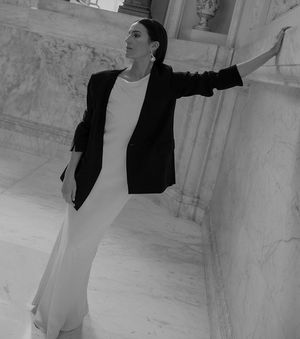

In-Flight Skincare Tips From The Experts
All products on this page have been selected by our editorial team, however we may make commission on some products.
Dr. Lana Kashlan
Cosmetic Dermatologist
“My number one tip for in-flight skincare is to wear sunscreen. The UV exposure on the plane is much greater than on land and so if you’re sitting next to the window make sure to apply sunscreen and close the window shade. I make sure to remove my make-up before overnight flights and then apply my retinoid cream to prevent any acne breakouts. I follow this with a barrier-repairing moisturiser like Avene Tolerance Control Soothing Skin Recovery Cream, and then apply Isdin Fotoprotector Fusion Water Magic SPF 50 Facial Sunscreen. I always travel with a small tube of the Eucerin Aquaphor Soothing Skin Balm because I can use it as an eye cream and to keep my lips hydrated. Finally, I always travel with the antibacterial hypochlorous acid from Tower 28 to cleanse my hands and face mid-flight.”
Follow @DrLanaKashlan
Dr. Malda AlDaoudi
Aesthetic Dermatologist
“I usually start with the Cetaphil Gentle Skin Cleanser to remove any make-up or pollutants. Next, I apply a hydrating serum from SkinCeuticals, or Theia Pearls with hyaluronic acid for deep hydration. I use a rich moisturiser from CeraVe or Cetaphil to seal in the serum's hydration. If I'm flying during the day, I protect my skin with a broad-spectrum sunscreen from Bioderma or La Roche-Posay. During the flight, I freshen up with the Evian Facial Mist. I apply a hydrating eye cream from Kiehl’s to nourish the delicate eye area, and keep my lips moisturised with the Avene Lip Repair nourishing balm, reapplying as needed. Before landing, I cleanse my face with micellar water or a gentle facial wipe and reapply my moisturiser to refresh my skin. If desired, I touch up with some light make-up, such as a tinted moisturizer or BB cream. This routine is tailored to combat the drying effects of airplane cabins and can be adjusted based on skin type and the flight's duration. The focus is on hydration and protection to keep skin feeling its best during and after the flight.”
Follow @DrMalda
Dr. Razan Kadry
Certified Dermatologist
“For optimal in-flight skincare, it's essential to address the effects of pollution on your skin. Using antiseptic sprays can help combat pollutants while simultaneously moisturising your skin, keeping it clean and hydrated. Additionally, to boost hydration, incorporate ceramide creams such as CeraVe and hyaluronic acid serums. These products will maintain your skin's health and radiance throughout the flight. I also like to use eye masks that depuff and a vitamin K eye cream like Isdin K-Ox Eyes to keep the area looking fresh. I also find that sheet masks help decrease the edema that often occurs, especially during long-haul flights. After using sheet masks, I recommend applying an antiseptic spray like Clinisept+ and following up with hydration using the L’Oréal Hyaluron Expert Replumping Face Serum or the MartiDerm Hyaluronic Firm Pure Active.”
Follow @DrRazanKadry
Dr. Tara Bardawil
Cosmetic & Medical Dermatologist
“At high altitudes, we are exposed to a significant amount of UV radiation, and UV rays are not completely filtered by glass or clouds, so sunscreen is essential. It's important to reapply every two hours to ensure continuous protection. Apply moisturiser as changes in the weather, the stress of flights and the climate on the airplane can dry out the skin. I recommend traveling without wearing make-up, as it allows your skin to breathe and reduces the risk of clogged pores. Drink lots of water, as it helps keep you refreshed, although it won’t significantly contribute to skin hydration. Additionally, frequently apply moisturiser on your hands to prevent them from drying out during the flight. I start by applying the Cicaplast Baume B5 cream or the Avene Cicalfate+ moisturiser, followed by an the Eucerin Hyaluron-Filler Anti-Wrinkle Eye Cream to nourish the delicate area around my eyes. Next, I apply the Vichy Capital Soleil UV-Age Daily SPF50+ sunscreen to protect my skin from UV rays, and I use a lip balm with SPF, like the QV Lip Balm SPF30 to keep my lips hydrated and shielded from the sun. Using a sheet mask is optional for me but when I do, I opt for hydrating and refreshing masks.”
Follow @Dr.Tara.Baradwil
DISCLAIMER: We endeavour to always credit the correct original source of every image we use. If you think a credit may be incorrect, please contact us at [email protected].





